2023届高考英语二轮复习:动词时态复习课件 (35张PPT)
文档属性
| 名称 | 2023届高考英语二轮复习:动词时态复习课件 (35张PPT) | 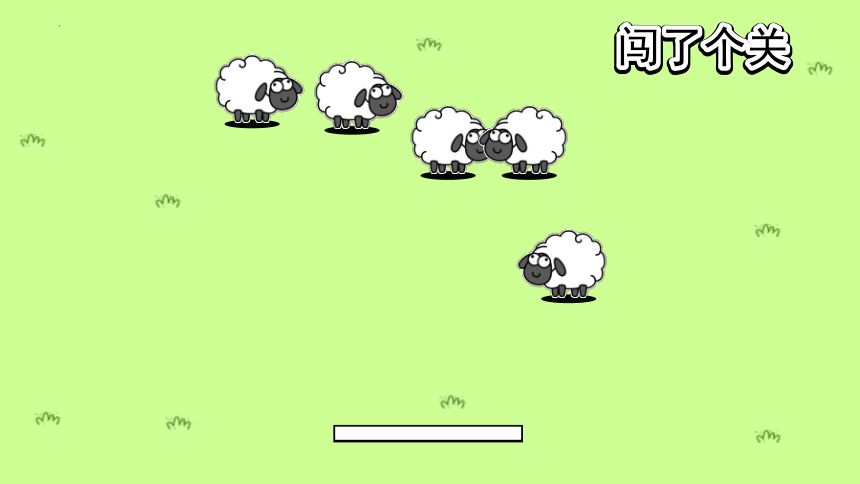 | |
| 格式 | pptx | ||
| 文件大小 | 10.6MB | ||
| 资源类型 | 教案 | ||
| 版本资源 | 通用版 | ||
| 科目 | 英语 | ||
| 更新时间 | 2023-01-03 10:35:54 | ||
图片预览

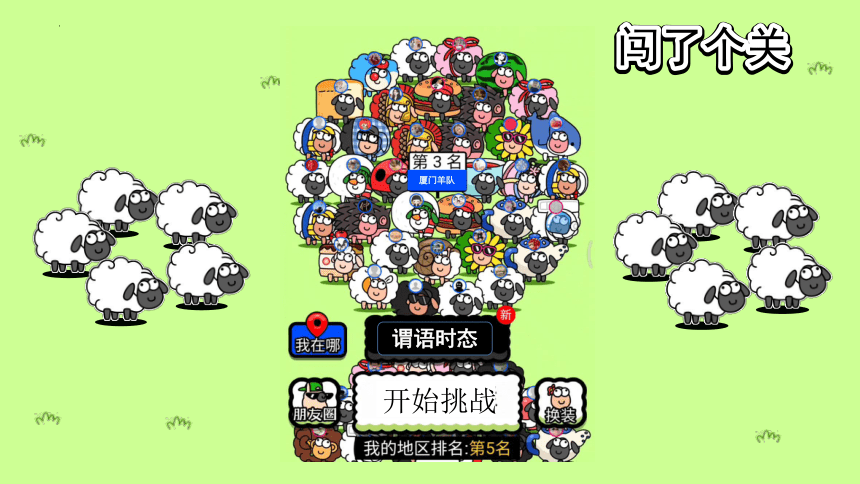
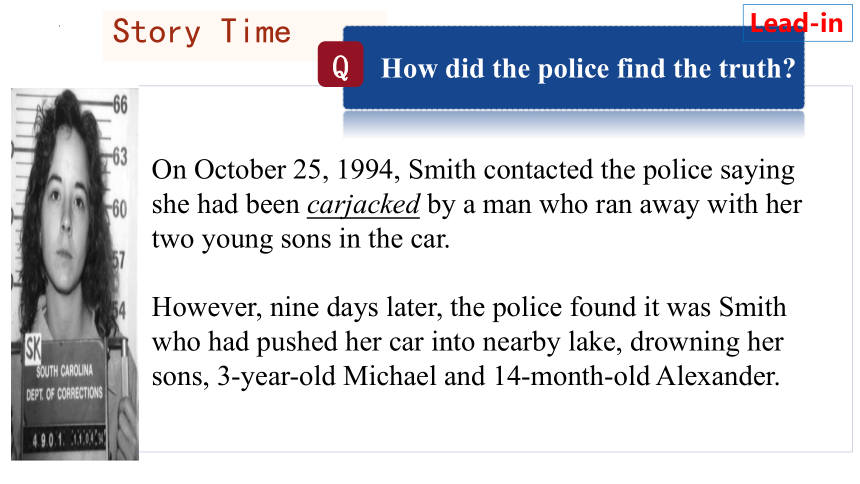
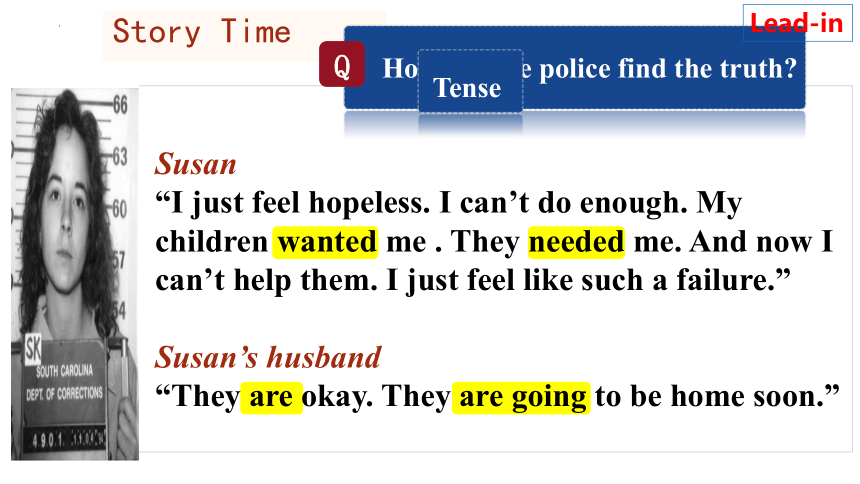


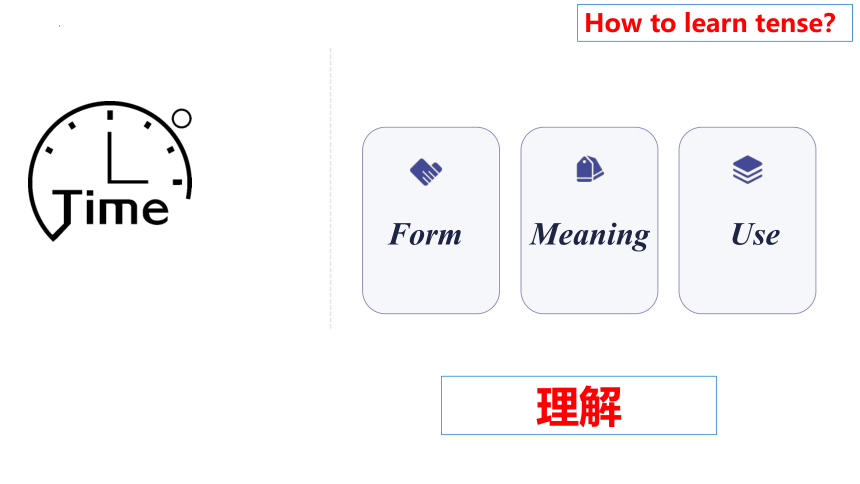
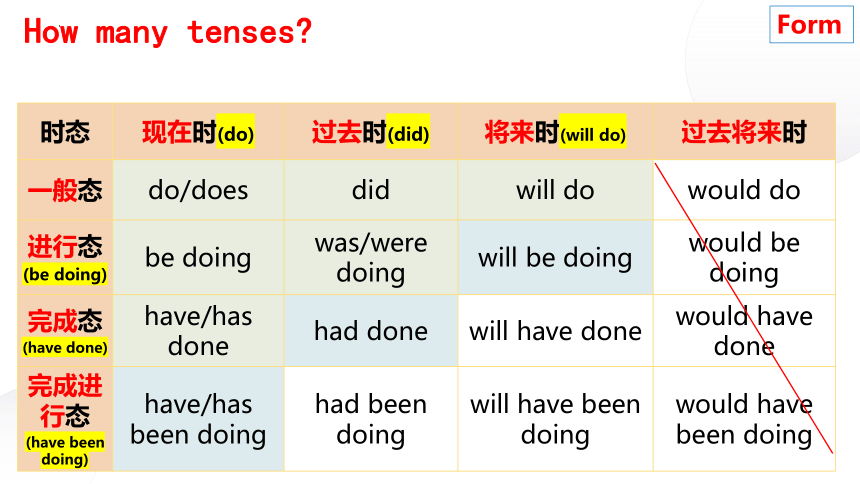
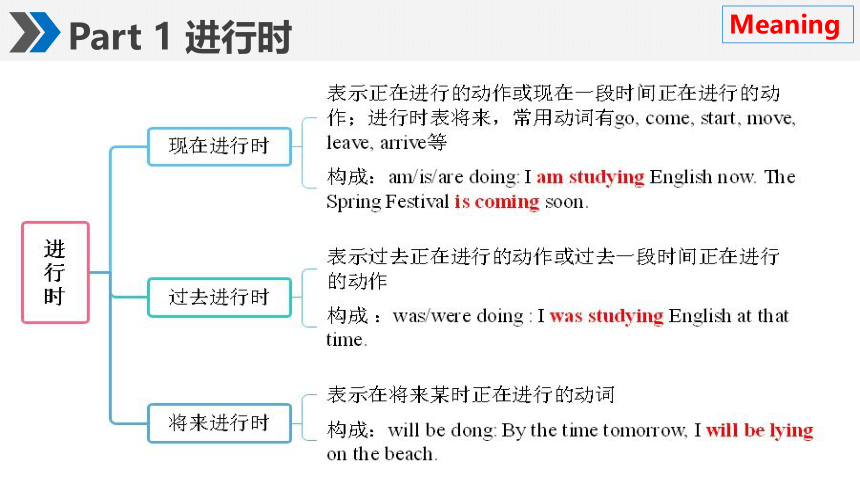
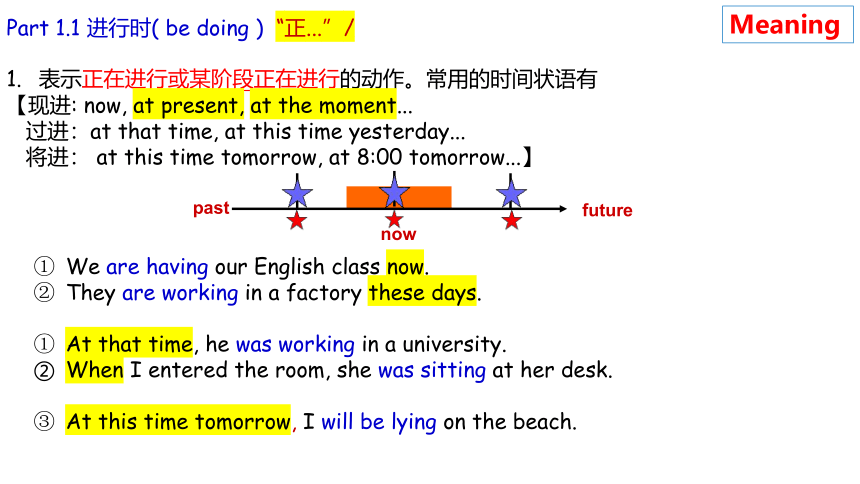


文档简介
(共35张PPT)
闯了个关
闯了个关
闯了个关
开始挑战
闯了个关
闯了个关
闯了个关
厦门羊队
谓语时态
Story Time
How did the police find the truth
Q
On October 25, 1994, Smith contacted the police saying she had been carjacked by a man who ran away with her two young sons in the car.
However, nine days later, the police found it was Smith who had pushed her car into nearby lake, drowning her sons, 3-year-old Michael and 14-month-old Alexander.
Lead-in
How did the police find the truth
Q
Susan
“I just feel hopeless. I can’t do enough. My children wanted me . They needed me. And now I can’t help them. I just feel like such a failure.”
Susan’s husband
“They are okay. They are going to be home soon.”
Tense
Story Time
Lead-in
时间的标记
下雨了。
下了雨。
下了雨了。
下过雨。
下过雨了。
下过了雨了。
It rained.
我在吃苹果。
我吃了苹果。
我吃过苹果。
I am eating an apple.
I ate an apple.
I have eaten an apple.
谓语出场,时态相随
What is tense?
I am reading a book.
I was bitten by a dog .
The thief stole everything, leaving nothing to me.
The thief had stolen all my money before I went back home.
I cleaned the kitchen, mopped the floor and turned off the lights before I left my room.
一个句子有且只有一个谓语动词
(除非 有and/ or 并列谓语;有从句)
How many predicate (谓)?
Form
Meaning
Use
How to learn tense?
理解
时态 现在时(do) 过去时(did) 将来时(will do) 过去将来时
一般态 do/does did will do would do
进行态 (be doing) be doing was/were doing will be doing would be doing
完成态 (have done) have/has done had done will have done would have done
完成进行态 (have been doing) have/has been doing had been doing will have been doing would have been doing
How many tenses
Form
Part 1 进行时
Meaning
future
past
now
Part 1.1 进行时( be doing ) “正...”/
表示正在进行或某阶段正在进行的动作。常用的时间状语有
【现进: now, at present, at the moment...
过进:at that time, at this time yesterday...
将进: at this time tomorrow, at 8:00 tomorrow...】
We are having our English class now.
They are working in a factory these days.
At that time, he was working in a university.
When I entered the room, she was sitting at her desk.
At this time tomorrow, I will be lying on the beach.
Meaning
Part 1.2 进行时( be doing ) 表将来
表示说话时正在进行或现阶段正在进行的动作。
表示按计划或安排即将进行的动作,表示这种动作的动词有:come, go, leave, arrive, start,等,并常与表示将来时间的状语连用。即:现在进行时表将来
They are visiting Beijing this week.
“The moment is coming soon”, he thought to himself.
Meaning
闯了个关
Look, the children ____(play) basketball on the playground.
are playing
题目1
消掉它们
Use
闯了个关
He__________(listen) to the radio when I came in.
was listening
题目2
消掉它们
Use
闯了个关
Now she (plan) our schedule for the trip.
is planning
题目3
消掉它们
Use
Part 2 一般时
Meaning
future
past
now
Part 2.1 一般过去时 (did)+一般将来时( will do或 be going to do)
1. 一过:表示过去发生的动作或状态。常见时间状语有: last week / two days ago / the other day / in 1990 /this morning / just now/ in the past等。
2. 一将:表示将来要发生的动作或状态。表将来的时间状语有: tomorrow/ next week / in the future / soon / this evening /in two days /someday/ in 2030...
I met him in the street yesterday.
The students went to the Great Wall last Sunday.
When she was in Shanghai, she often came to see me.
Look at the clouds. It is going to rain.
He will be back in a few days.
I am about to close the door when the telephone rings. 正要做...突然
Meaning
Part 2.2 一般现在时
表示客观事实或真理
表示经常性或习惯性发生的动作或状态(常用的时间状语有sometimes / often / always /usually/ seldom/ every (morning…) 等 )
主将从现
future
past
now
The earth moves around the sun.
I eat apples.
He owns a car and a house.
The shop closes at 11:00 p.m. every day.
If you ______ (be) free tomorrow, I'll go with you.
Meaning
我是吃苹果的。
闯了个关
If their marketing plans succeed, they ________(increase)their sales by 20 percent.
will increase
题目4
消掉它们
Use
闯了个关
He said that he__________ (come) back in five minutes.
would come
题目5
消掉它们
Use
闯了个关
The teacher told us the earth_______ (move) around the sun.
moves
题目6
消掉它们
Use
Meaning
Part 3 完成时
Part 3.1 现在完成时 ( have / has done) “已经...”
表示过去的动作对现在的影响和结果。
表示从过去某一时刻持续到现在的动作或状态。
常用的时间状语有: up to/till/by now, so far, lately, recently (in recent years), already, yet, ever since, in/during/over the past/last +时间段
future
past
now
He has already finished his work.
We have visited the city three times.
I have studied English for six years.
They have lived in the city since 1988.
Meaning
Part3.2 过去完成时 ( had done)和将来完成时( will have done)
表示在过去/将来某一时间或动作之前已发生的动作。 常用的时间状语有: by +时间
intend, mean, hope, want, plan等动词用过去完成时表示过去未能实现的计划、或希望等. (“本...”)
We had learnt 30 lessons by the end of last month.
Until then, he had known nothing about it.
I had intended to see you, but I was busy.
By the end of 2037, the world’s population will have reached 9 billion. (将来完成时)
future
past
now
过去完成时:过去的过去
将来完成时
Meaning
Part 3.3 现在完成进行时 ( have / has been doing) “一直...”
表示从过去某一时刻一直持续到现在的动作或状态。有时可与现在完成时的第二种用法互换。
表示不断地重复发生的动作(感彩)
常见时间状语: these days, all morning, for the whole day...
future
past
now
He has been playing the guitar since he was five.
I have been waiting for you all afternoon.
We’ve been making the same mistakes these days.
Meaning
闯了个关
You should go to bed for your well being. You _________ (watch) TV for 5 hours.
Since 2011, the country ____ (grow) more corn than rice.
have been watching
has grown
题目7
消掉它们
Use
什么是现在?什么是过去?
一般过去时发生在过去吗?
一般现在时发生在现在还是过去?
现在完成时 (have done) 发生在现在还是过去?
一般过去时和现在完成时有什么区别?
终极问答
Summary
一般过去时vs现在完成时
1. She went to Beijing.
她去过北京。
2. She has gone to Beijing.
她已经去了北京了。(她现在不在,要找她等她回来)
易错点1 一般过去时vs现在完成时 vs 现在完成进行时
现在完成时 vs 现在完成进行时
I have read the book.
我已经读过这本书。(对现在的影响:知道大结局了)
I have been reading the book.
我一直在读这本书。
I have struggled.
我已挣扎过。
I have been struggled.
我一直在挣扎。
现在完成时VS现在完成进行时 终极PK
She ____________ (meet) the boy in the library again.
She _____________ (meet) a boy in the library lately.
Tom _______________ (ride) horses the whole morning.
Tom _______________ (ride) horses three times this morning.
has met
has been meeting
has been riding
has ridden
易错点1 一般过去时vs现在完成时 vs 现在完成进行时
易错点2 动词的变形
动词碰到第三人称单数时,要加 “s”
直接加s。如:work -> works
以”辅音字母+y”结尾的词,把y变i,再加es。如:carry -> carries
以s、x、ch、sh结尾的加es。如:wash -> washes
动词三单
变化规则
动词-ing
变化规则
易错点2 动词的变形
动词-ed
变化规则
易错点2 动词的变形
易错点3 被动语态
1 现在进行时(be doing)
2 一般现在时 (do)
3 现在完成时(have done)
4 一般将来时(will do)
5 过去进行时(was/were doing)
6 一般过去式(did)
7 过去完成时(had done)
is/am/are being done
is/am/are done
have/has been done
will be done
was/were being done
was/were done
had been done
be done
have done/had done主动还是被动
易错点4 固定搭配
1. 过去完成时可以用于 hardly ... when ...或 no sooner ... than ... 等结构,表示“一……就……”
I had hardly entered the classroom when the bell rang.
No sooner had he got to the station than the bus arrived.
2.“It/This is (was) the+序数词+time+that+… 现完(过完)”
It is the first time that she has sung in public.
It was the first time that she had sung in public.
闯了个关
闯了个关
闯了个关
开始挑战
闯了个关
闯了个关
闯了个关
厦门羊队
谓语时态
Story Time
How did the police find the truth
Q
On October 25, 1994, Smith contacted the police saying she had been carjacked by a man who ran away with her two young sons in the car.
However, nine days later, the police found it was Smith who had pushed her car into nearby lake, drowning her sons, 3-year-old Michael and 14-month-old Alexander.
Lead-in
How did the police find the truth
Q
Susan
“I just feel hopeless. I can’t do enough. My children wanted me . They needed me. And now I can’t help them. I just feel like such a failure.”
Susan’s husband
“They are okay. They are going to be home soon.”
Tense
Story Time
Lead-in
时间的标记
下雨了。
下了雨。
下了雨了。
下过雨。
下过雨了。
下过了雨了。
It rained.
我在吃苹果。
我吃了苹果。
我吃过苹果。
I am eating an apple.
I ate an apple.
I have eaten an apple.
谓语出场,时态相随
What is tense?
I am reading a book.
I was bitten by a dog .
The thief stole everything, leaving nothing to me.
The thief had stolen all my money before I went back home.
I cleaned the kitchen, mopped the floor and turned off the lights before I left my room.
一个句子有且只有一个谓语动词
(除非 有and/ or 并列谓语;有从句)
How many predicate (谓)?
Form
Meaning
Use
How to learn tense?
理解
时态 现在时(do) 过去时(did) 将来时(will do) 过去将来时
一般态 do/does did will do would do
进行态 (be doing) be doing was/were doing will be doing would be doing
完成态 (have done) have/has done had done will have done would have done
完成进行态 (have been doing) have/has been doing had been doing will have been doing would have been doing
How many tenses
Form
Part 1 进行时
Meaning
future
past
now
Part 1.1 进行时( be doing ) “正...”/
表示正在进行或某阶段正在进行的动作。常用的时间状语有
【现进: now, at present, at the moment...
过进:at that time, at this time yesterday...
将进: at this time tomorrow, at 8:00 tomorrow...】
We are having our English class now.
They are working in a factory these days.
At that time, he was working in a university.
When I entered the room, she was sitting at her desk.
At this time tomorrow, I will be lying on the beach.
Meaning
Part 1.2 进行时( be doing ) 表将来
表示说话时正在进行或现阶段正在进行的动作。
表示按计划或安排即将进行的动作,表示这种动作的动词有:come, go, leave, arrive, start,等,并常与表示将来时间的状语连用。即:现在进行时表将来
They are visiting Beijing this week.
“The moment is coming soon”, he thought to himself.
Meaning
闯了个关
Look, the children ____(play) basketball on the playground.
are playing
题目1
消掉它们
Use
闯了个关
He__________(listen) to the radio when I came in.
was listening
题目2
消掉它们
Use
闯了个关
Now she (plan) our schedule for the trip.
is planning
题目3
消掉它们
Use
Part 2 一般时
Meaning
future
past
now
Part 2.1 一般过去时 (did)+一般将来时( will do或 be going to do)
1. 一过:表示过去发生的动作或状态。常见时间状语有: last week / two days ago / the other day / in 1990 /this morning / just now/ in the past等。
2. 一将:表示将来要发生的动作或状态。表将来的时间状语有: tomorrow/ next week / in the future / soon / this evening /in two days /someday/ in 2030...
I met him in the street yesterday.
The students went to the Great Wall last Sunday.
When she was in Shanghai, she often came to see me.
Look at the clouds. It is going to rain.
He will be back in a few days.
I am about to close the door when the telephone rings. 正要做...突然
Meaning
Part 2.2 一般现在时
表示客观事实或真理
表示经常性或习惯性发生的动作或状态(常用的时间状语有sometimes / often / always /usually/ seldom/ every (morning…) 等 )
主将从现
future
past
now
The earth moves around the sun.
I eat apples.
He owns a car and a house.
The shop closes at 11:00 p.m. every day.
If you ______ (be) free tomorrow, I'll go with you.
Meaning
我是吃苹果的。
闯了个关
If their marketing plans succeed, they ________(increase)their sales by 20 percent.
will increase
题目4
消掉它们
Use
闯了个关
He said that he__________ (come) back in five minutes.
would come
题目5
消掉它们
Use
闯了个关
The teacher told us the earth_______ (move) around the sun.
moves
题目6
消掉它们
Use
Meaning
Part 3 完成时
Part 3.1 现在完成时 ( have / has done) “已经...”
表示过去的动作对现在的影响和结果。
表示从过去某一时刻持续到现在的动作或状态。
常用的时间状语有: up to/till/by now, so far, lately, recently (in recent years), already, yet, ever since, in/during/over the past/last +时间段
future
past
now
He has already finished his work.
We have visited the city three times.
I have studied English for six years.
They have lived in the city since 1988.
Meaning
Part3.2 过去完成时 ( had done)和将来完成时( will have done)
表示在过去/将来某一时间或动作之前已发生的动作。 常用的时间状语有: by +时间
intend, mean, hope, want, plan等动词用过去完成时表示过去未能实现的计划、或希望等. (“本...”)
We had learnt 30 lessons by the end of last month.
Until then, he had known nothing about it.
I had intended to see you, but I was busy.
By the end of 2037, the world’s population will have reached 9 billion. (将来完成时)
future
past
now
过去完成时:过去的过去
将来完成时
Meaning
Part 3.3 现在完成进行时 ( have / has been doing) “一直...”
表示从过去某一时刻一直持续到现在的动作或状态。有时可与现在完成时的第二种用法互换。
表示不断地重复发生的动作(感彩)
常见时间状语: these days, all morning, for the whole day...
future
past
now
He has been playing the guitar since he was five.
I have been waiting for you all afternoon.
We’ve been making the same mistakes these days.
Meaning
闯了个关
You should go to bed for your well being. You _________ (watch) TV for 5 hours.
Since 2011, the country ____ (grow) more corn than rice.
have been watching
has grown
题目7
消掉它们
Use
什么是现在?什么是过去?
一般过去时发生在过去吗?
一般现在时发生在现在还是过去?
现在完成时 (have done) 发生在现在还是过去?
一般过去时和现在完成时有什么区别?
终极问答
Summary
一般过去时vs现在完成时
1. She went to Beijing.
她去过北京。
2. She has gone to Beijing.
她已经去了北京了。(她现在不在,要找她等她回来)
易错点1 一般过去时vs现在完成时 vs 现在完成进行时
现在完成时 vs 现在完成进行时
I have read the book.
我已经读过这本书。(对现在的影响:知道大结局了)
I have been reading the book.
我一直在读这本书。
I have struggled.
我已挣扎过。
I have been struggled.
我一直在挣扎。
现在完成时VS现在完成进行时 终极PK
She ____________ (meet) the boy in the library again.
She _____________ (meet) a boy in the library lately.
Tom _______________ (ride) horses the whole morning.
Tom _______________ (ride) horses three times this morning.
has met
has been meeting
has been riding
has ridden
易错点1 一般过去时vs现在完成时 vs 现在完成进行时
易错点2 动词的变形
动词碰到第三人称单数时,要加 “s”
直接加s。如:work -> works
以”辅音字母+y”结尾的词,把y变i,再加es。如:carry -> carries
以s、x、ch、sh结尾的加es。如:wash -> washes
动词三单
变化规则
动词-ing
变化规则
易错点2 动词的变形
动词-ed
变化规则
易错点2 动词的变形
易错点3 被动语态
1 现在进行时(be doing)
2 一般现在时 (do)
3 现在完成时(have done)
4 一般将来时(will do)
5 过去进行时(was/were doing)
6 一般过去式(did)
7 过去完成时(had done)
is/am/are being done
is/am/are done
have/has been done
will be done
was/were being done
was/were done
had been done
be done
have done/had done主动还是被动
易错点4 固定搭配
1. 过去完成时可以用于 hardly ... when ...或 no sooner ... than ... 等结构,表示“一……就……”
I had hardly entered the classroom when the bell rang.
No sooner had he got to the station than the bus arrived.
2.“It/This is (was) the+序数词+time+that+… 现完(过完)”
It is the first time that she has sung in public.
It was the first time that she had sung in public.
